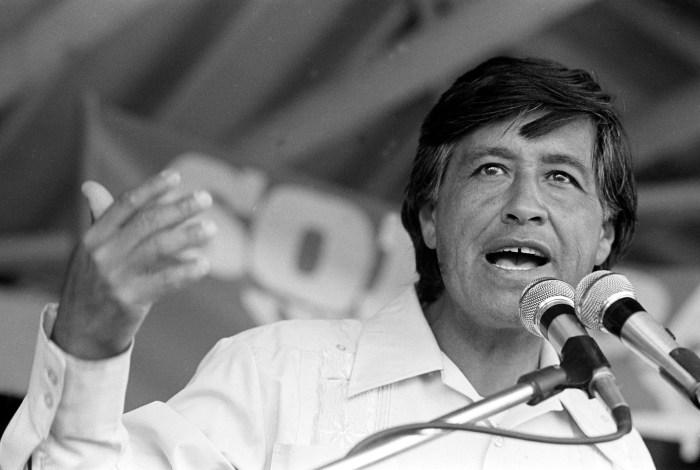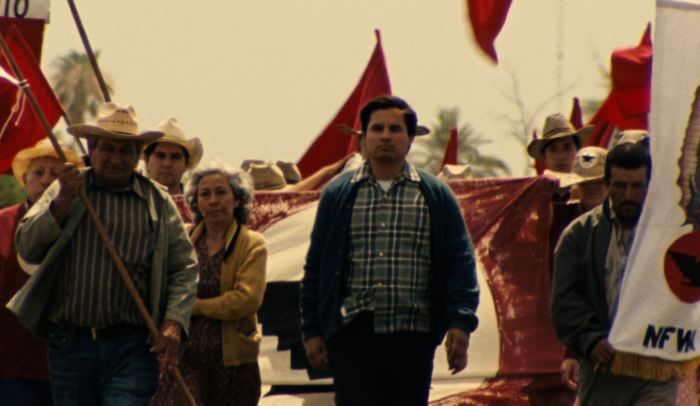Embarking on a journey through the realm of “Cesar Chavez Movie Questions and Answers,” this discourse delves into the cinematic portrayal of the farmworkers’ movement, unraveling its historical significance, social impact, and cultural relevance.
The film, a cinematic masterpiece, captivates audiences with its poignant depiction of Cesar Chavez’s unwavering determination and the challenges faced by the farmworkers in their quest for justice.
Film Synopsis

The film “Cesar Chavez” chronicles the life and legacy of the iconic labor leader who dedicated his life to fighting for the rights of farmworkers in the United States. Set against the backdrop of the tumultuous 1960s, the film follows Chavez’s journey as he organizes the National Farm Workers Association (NFWA), later renamed United Farm Workers (UFW), and leads a series of nonviolent strikes and boycotts to demand better wages, working conditions, and respect for the dignity of farmworkers.
The film highlights the historical context of the farmworkers’ movement, including the harsh conditions they faced, the exploitation and discrimination they endured, and the systemic challenges they had to overcome. It also explores the strategies and tactics employed by Chavez and his followers, such as nonviolent civil disobedience, community organizing, and the power of collective action.
Character Analysis

Cesar Chavez, Cesar chavez movie questions and answers
Cesar Chavez is portrayed as a charismatic and determined leader who possessed a deep commitment to social justice. He is depicted as a humble man of unwavering faith, who believed in the power of nonviolence and the importance of building a united movement.
The film explores Chavez’s motivations, challenges, and triumphs, including his personal struggles and sacrifices, as well as his unwavering belief in the dignity of all workers.
Other Key Characters
- Dolores Huerta: A co-founder of the NFWA, Huerta is portrayed as a fierce advocate for farmworkers’ rights and a close confidant of Chavez.
- Larry Itliong: A Filipino-American labor leader who played a pivotal role in organizing the Delano grape strike.
- Fred Ross: A prominent civil rights lawyer who provided legal support to the farmworkers’ movement.
Social and Political Impact
The film “Cesar Chavez” had a profound impact on raising awareness about the plight of farmworkers in the United States. It helped to galvanize public support for the farmworkers’ movement and inspired a new generation of activists to fight for social justice.
The film also contributed to the growing awareness of the importance of labor rights and the need for fair treatment of all workers.
The film’s depiction of Chavez’s nonviolent approach to activism and his commitment to building a broad-based coalition had a significant influence on social and political movements around the world. It inspired other leaders and organizations to adopt similar strategies in their own struggles for justice and equality.
Cinematography and Directing
The film “Cesar Chavez” is notable for its evocative cinematography and skillful directing. The use of handheld cameras and natural lighting creates a sense of intimacy and realism, immersing the viewer in the world of the farmworkers. The film’s pacing and editing contribute to a sense of urgency and momentum, reflecting the intensity and determination of the farmworkers’ movement.
Director Diego Luna effectively employs symbolism and visual metaphors throughout the film. For example, the use of wide shots of the vast farmlands highlights the scale of the farmworkers’ struggle, while close-ups of their faces convey the personal toll of their sacrifices.
Cultural and Historical Relevance

The film “Cesar Chavez” has significant cultural and historical relevance as it sheds light on a crucial chapter in the American civil rights movement. It contributes to a broader understanding of the struggles faced by marginalized communities and the power of collective action in achieving social change.
The film also serves as a reminder of the ongoing fight for workers’ rights and the importance of protecting the dignity of all laborers. It encourages viewers to reflect on the legacy of Cesar Chavez and to continue to work towards a more just and equitable society.
Reception and Reviews: Cesar Chavez Movie Questions And Answers
The film “Cesar Chavez” received critical acclaim upon its release, with praise for its powerful storytelling, strong performances, and impactful message. It was nominated for numerous awards, including the Golden Globe Award for Best Motion Picture – Drama and the Screen Actors Guild Award for Outstanding Performance by a Cast in a Motion Picture.
Audiences also responded positively to the film, with many commending its ability to raise awareness about the farmworkers’ movement and inspire a sense of hope and determination. The film has been widely used in educational settings and community screenings to teach about the history of labor rights and the importance of social activism.
Quick FAQs
What is the central theme of the film “Cesar Chavez”?
The film revolves around the theme of social justice, highlighting the struggle of farmworkers for fair wages, humane working conditions, and the right to unionize.
How does the film portray the character of Cesar Chavez?
Cesar Chavez is depicted as a charismatic and dedicated leader, driven by a deep commitment to nonviolent resistance and the empowerment of the farmworkers.
What is the historical significance of the farmworkers’ movement?
The farmworkers’ movement played a pivotal role in raising awareness about the plight of migrant workers, leading to significant labor reforms and improvements in their working conditions.


